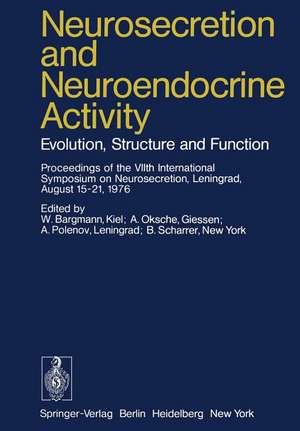Neurosecretion and Neuroendocrine Activity: Evolution, Structure and Function
Editat de W. Bargmann, A. Oksche, A. Polenov, B. Scharreren Limba Engleză Paperback – 23 feb 2012
The book deals with three major approaches in elucidating the general evolutionary events responsible for the structure and function of neurosecretory elements: (1) phylogenetic development of neurosecretory elements and their function, (2) ontogenetic development of neurosecretory elements and their function, and (3) the role of neuroendocrine mechanisms in realizing species adaptation, i.e., mechanisms causing the evolutionary process.
Half of the chapters deal with evolutionary aspects. The majority of them are concerned with the role of different types of neurosecretory cells in the regulation of homeostasis and of the function of endocrine glands, primarily that of the adenohypophysis.
The other half are concerned with various aspects of neurosecretion, featuring two main problems: (1) investigation of neural and hormonal mechanisms regulating the function of neurosecretory cells and neurosecretory centers as a whole, and (2) investigation of the role of neurosecretory systems in the regulation of adaptive reactions of the organism.
Preț: 726.88 lei
Preț vechi: 765.14 lei
-5% Nou
Puncte Express: 1090
Preț estimativ în valută:
139.08€ • 145.61$ • 115.09£
139.08€ • 145.61$ • 115.09£
Carte tipărită la comandă
Livrare economică 05-19 aprilie
Preluare comenzi: 021 569.72.76
Specificații
ISBN-13: 9783642668876
ISBN-10: 3642668879
Pagini: 440
Ilustrații: XVIII, 415 p.
Dimensiuni: 170 x 244 x 23 mm
Greutate: 0.69 kg
Ediția:Softcover reprint of the original 1st ed. 1978
Editura: Springer Berlin, Heidelberg
Colecția Springer
Locul publicării:Berlin, Heidelberg, Germany
ISBN-10: 3642668879
Pagini: 440
Ilustrații: XVIII, 415 p.
Dimensiuni: 170 x 244 x 23 mm
Greutate: 0.69 kg
Ediția:Softcover reprint of the original 1st ed. 1978
Editura: Springer Berlin, Heidelberg
Colecția Springer
Locul publicării:Berlin, Heidelberg, Germany
Public țintă
ResearchCuprins
Mathias Thomsen 1896–1976. In memoriam.- Opening Remarks.- Evolutionary Aspects of Neuroendocrinology.- Current Concepts on the Evolution of the Neurosecretory Neuron.- Evolutionary Basis of the General Principle of Neuroendocrine Regulation. Interaction of Peptide and Monoamine Neurohormones in a Dual Control Mechanism.- Molecular Evolution of Neurohypophyseal Hormones and Neurophysins.- Morphofunctional Evolution of the Neurohemal Regions of the Hypothalamo-Hypophyseal System.- Monoaminergic Structures Within the Hypothalamo-Hypophyseal Complex in the Phylogenesis of Vertebrates.- Evolution of the Neurosecretory System in Crustacea.- Neurosecretion and Evolution of the Visceral Nervous System in Insects.- Pattern of Neuroendocrine Cell Complexes (Subunits) in Hypothalamic Nuclei: Neurobiological and Phylogenetic Concepts.- Evolution of Perisympathetic Organs and Insect Phylogeny.- Ontogenesis of Neurosecretory Systems.- Correlation Between Synthesis and Release of CRF During Stress at Different Periods of Rat Postnatal Ontogenesis.- Time of Cell Origin in Mouse Supraoptic Nucleus.- Effect of Extirpation of the Cervical Sympathetic Ganglia on Development of the Neurosecretory Peptidergic and Parvocellular Nuclei of Rat Hypothalamus During Postnatal Ontogenesis.- Hypothalamic Control of the Development of Endocrine Functions in the Human Fetus.- Hypothalamic Control of Glucocorticoid Activity. The Adrenal Gland of the Fetal Rat.- Morphofunctional Characteristics of the Hypothalamo-Hypophyseal Neurosecretory System (HHNS) in Round Goby, Gobius melanostomus Pallas, in Early Ontogenesis.- Embryonization of Development and Differentiation of the Neurosecretory System in Insect Embryogenesis.- Nuclear Volume Changes in Cells of the Nucleus arcuatus (NA) During Prenatal Development in Man.- Investigations on the Development of the Hypothalamo-Hypophyseal Neurosecretory System During Ontogenesis in the Chick, Gallus gallus L..- Regularities in the Development of Nucleus praeopticus (Np) in Acipenseridae.- Structure and Function of Neurosecretory Systems in the Brain of Vertebrates.- Neurosecretion in Vertebrates.- Fat Ingestion as a Stimulus of Vasopressin (ADH) Release.- Comparative Light- and Electron-Microscopic Investigations of Neurosecretory Cells.- Extravascular Spaces in the Pituitary of Teleostei Revealed by Use of Horseradish Peroxidase.- Some Neuroendocrine Aspects of Tanycyte Histophysiology.- Adrenergic Regulation of Hypothalamic Neurosecretory Functions.- Fine Organization of Smooth Endoplasmic Reticulum in Neurosecretory Axons of Rat Neurohypophysis.- Effects of Different Salinities on the Neurohypophysis and Blood Osmolarity in Acipenser ruthenus L..- Effects of Indomethacin on the Hypothalamo-Hypophyseal Neurosecretory System.- Functional Morphology of the Peptidergic Hypothalamo-Hypophyseal Neurosecretory System of Rat in Postnatal Ontogenesis After Exposure to Aromatic Hydrocarbons.- Pituitary Gonadotropic Activity and Ovarian Function After Deafferentation of the Mediobasal Hypothalamus (MBH) in the Rat.- Median Eminence (ME) of Hypophysectomized Rats: Structure and Ultrastructure.- The Supraoptico-Hypophyseal Neurosecretory System, Plasma Antidiuretic Activity, and Concentrating Ability of Kidneys in the Desert Rodent Big Gerbil (Rhombomys opimus).- Ultrastructure of the Nucleus arcuatus (NARC) in Normal and Hypophysectomized Rats.- Functional Morphology of the Neurohormonal System in Myocardial Infarction.- The Functional Morphology of the Hypothalamo-Hypophyseal Neurosecretory System (HHNS) After Direct and Reflex Stimulation of the Hypothalamus in Cats.- Ultrastructural Changes in the Hypothalamus and Neurohypophysis of Rats After Chronic Morphine Treatment.- Granulolysis, a Possible Intracellular Regulatory Mechanism of Neurosecretion in the Hypothalamo-Posthypophyseal System of the Rat.- Immunohistochemistry of the Hypothalamo-Neurohypophyseal System in the Common Spiny Mouse, Acomys cahirinus.- Induced Spawning of Clarias batrachus (Linn) Using Clomid, and Observations on the Consequential Resulting Histochemical Changes Exhibited by the Nucleus lateralis tuberis (NLT), Pituitary Cyanophils, and Caudal Neurosecretory Neurons.- Role of the Preoptic Recess Ependyma in the Formation and Physiologic Regeneration of the Nucleus praeopticus in Amphibians.- Adrenergic Mechanisms in the Hypothalamic Regulation of Pituitary Thyrotropic Function.- Efferent Projections from the Preoptic Area in the Hypothalamus.- Classical (“Gomori-positive”) Neurosecretory System in the Rat After Isolation of the Medial Basal Hypothalamus and Adrenalectomy.- Age- and Sex-Dependent Biotransformation of Androgens in the Pituitary, Pineal Gland, and Arcuate Nucleus of the Hypothalamus of Rats.- Experimental Studies of the Dynamics of Herring Bodies. Ultrastructure of Axon Dilatations Developing at the Site of Compression or Transection of Neurosecretory Axons in the Grass Frog Rana pipiens.- Immunoenzyme Cytochemical Demonstration of Peptidergic Nerve Fibers in the Pars intermedia of the Amphibian Hypophysis.- Role of Biogenic Amines and M-Cholinergic Structures of the Rat Brain in the Hypothalamo-Hypophyseal Neurosecretory System (HHNS) Under Shock.- Autoradiographic Studies on the Incorporation of Labeled Amino Acids in the Brain After Injection of Oxytocin.- Comparative Account of the Hypothalamus of Amphibians; a Neuroanatomic Approach.- Functional Organization of the Hypothalamus in the Regulation of CRF-Producing Neurons.- Pituicytes: Their Reaction to Microtubule Poisons in vivo and in vitro.- Hypothalamo-Hypophyseal System in Calamoichthys calabaricus smithi (Polypteriformes).- Vasotocin Immunoreactive Neurons in the Hypothalamus of Some Nonmammalian Vertebrates.- New Protein Complexes in the Gomori-Positive Neurosecretion of the Hypothalamo-Neurohypophyseal System.- Morphofunctional Characteristics of Hypothalamo-Hypophyseal Structures Following Adrenalectomy.- Role of the Pineal Gland in the Hypothalamic Regulation of Adenohypophyseal Functions.- Role of the Amygdaloid Complex in the Secretion of Antidiuretic Hormone and Oxytocin.- Hypothalamic Nuclei of Rats Treated with Corticosteroids.- Neurosecretory System of Dogfish, Scylliorhinus caniculus, Under Normal Conditions and After Osmotic Loading.- Fluorescence and Electron-Microscopic Study of the Meta- Adenohypophysis of the Carp, Cyprinus carpio L..- Effects of Temperature on the Preopticohypophyseal Neurosecretory System of Carp, Cyprinus carpio L..- Ecologic-Histophysiologic Analysis of Neuroglial and Blood Elements in the Neurohypophysis of Sturgeon, Acipenser güldenstädti Brandt.- Neurosecretory Supply to Extrahypothalamic Structures: Choroid Plexus, Circumventricular Organs, and Limbic System.- Ecological and Histophysiological Investigation of the Hypothalamic Peptidergic Centers in Rodents Under Conditions of Hypobaric Hypoxia.- Reaction of Rat Hypothalamic, Supraoptic, and Arcuate Nuclei Neurons in Experiment.- Neurohypophysis and Thyroid Gland of Fry Acipenser stellatus Pallas and Acipenser güldenstädti Brandt During Downstream Migration.- Alterations of Sex-Differentiation of the Hypothalamus by Sex-Steroids Demonstrated by Ultramorphometric Studies of the Adrenal Cortex in Adult Rats.- Neural Lobe of the Hypophysis of Rats Subjected to Noise.- Adenylate-Cyclase Activity in the Neurosecretory Nuclei of Rat Hypothalamus.- Immunohistochemical Demonstration of S-100 Protein and GFA Protein in Interstitial Cells of Rat Pineal Gland.- Effects of Aldosterone on the Ultrastructure of Rat Hypothalamo-Neurohypophyseal Neurosecretory System.- Ultrastructural Method for Identifying Neurophysin-Containing Vesicles of the Neurosecretory System of Vertebrates.- Hypothalamic Structures Responsible for Regulation of Reproduction of Waterfowl.- Adrenergic Mechanisms in the Hypothalamic Control of Pituitary Adrenocorticotropic Function.- Concentrations of the Neurotransmitters in the Supraoptic and Paraventricular Nuclei of the Rat.- Neurosecretory and Pars-Intermedia Cells of Fish and Mammals.- Histochemical and Histospectrophotometric Study of PAS-Positive Material in the Hypothalamo-Hypophyseal Neurosecretory Pathway.- Functional Morphology of the Synaptic Apparatus of Peptidergic Neurosecretory Cells in the Nucleus praeopticus of Carp Cyprinus carpio L..- Seasonal Dynamics of the Activity of the Hypothalamo-Pituitary Neurosecretory System, Thyroid and Adrenal Cortex in Lemmings (Dicrostonyx torquatus Vinogradovi Ognev, 1948).- Reaction of Magnocellular Hypothalamic Nuclei to Unilateral and Full Thyroidectomy During Early Ontogenesis.- Effect of Intracranial Hypertension on Glycogen Accumulation in the Neurohypophysis.- Significance of the Mediobasal Hypothalamus in Regulation of Gonadal Functions in Birds.- Autoradiographic Localization of 3H-Oxytocin in the Rat Brain.- Hypothalamo-Pituitary Neurosecretory System of Rats After a 22-Day Space Flight.- Hormonal Regulation of Catecholamine Metabolism in the Rat Brain.- Efferent Oxytocinergic Projections from the Hypothalamus to the Hindbrain in Rats and Pigeons.- Changes in Hypothalamic Multiunit Activity After Hemorrhage in Anesthetized Rabbits.- Effect of Intraventricular Administration of Oxytocin and Vasopressin on Self-stimulation and Reaction Time in Rats.- Secretory Function of Neurons of the Suprachiasmatic Nucleus in the White Mouse and Rat.- Localization of LH-RH-containing Neurons in the Rabbit Brain.- Seasonal Changes in the Structure of the Neurohypophysis and Thyroid Gland of the Great Spotted Woodpecker, Dendrocopos major L..- Morphofunctional Activity of the Hypothalamo-Hypophyseal Neurosecretory System (HHNS) After Destruction of the Median Eminence in Cold Stress.- Effects of Posterior-Pituitary-Lobe Peptides on the Maintenance of a Conditioned Avoidance Response in Rats.- Oxytocinergic Extrahypothalamic Neurosecretory System of the Vertebrates and Memory Processes.- Functional Significance of Two Types of Neurosecretory Granules in the Posthypophysis: Ultrastructural and Cytochemical Approach.- Functional State of the Praeopticohypophyseal Neurosecretory System (PHNS) of the Prespawning Lake Whitefish, Coregonus autumnalis migratorius G..- Oxytocic Activity of the Cerebrospinal Fluid and Changes in the EEG Before and During Pregnancy and Labor in the Rabbit.- The Hypothalamic Influence on Secretion of the Adenohypophysis Cultured in the Anterior Chamber of the Eye.- Distribution of Vasopressin, Oxytocin, Neurophysin, Somatostatin, and Luteinizing Hormone Releasing Hormone-Producing Neurons.- Immunohistologic Identification of Vertebrate Neurophysins.- Hypothalamic Neurosecretion in Mink (Mustela vison Schreb.) Kept Under Various Photoperiodic Conditions.- Annual Dynamics of Activity of the Hypothalamo-Hypophyseal Neurosecretory System in Ground Squirrels, Citellus erythrogenys Brandt and C. undulatus Pallas.- Morphofunctional Basis of Involutional Changes in the Neuroendocrine System.- Interrelationship of the Hypothalamus and the Gonads in the Fish Aspro zindel L..- Effects of Low-Molecular-Weight Substances on Synthesis and Release of Prolactin in Rat.- Caudal Neurosecretory System of Fishes.- Caudal Neurosecretory System of Fishes in 1976.- Acetylcholine in the Urophysis and Release of Urophysial Hormones by Neurotransmitters in Vitro.- Caudal Neurosecretory System in Acipenseridae and Some Aspects of Its Evolution.- Ultrastructure of the Caudal Neurosecretory System in Acipenseridae.- Structure and Function of Neurosecretory Systems in Invertebrates.- Neurosecretion in the Frontal Ganglion of the Stick Insect, Carausius morosus.- Immunochemical Investigations on the Neuroendocrine System of the Cockroach, Periplaneta americana L..- Neural and Neurohormonal Control of the Circadian Rhythm of Blood Trehalose in the Cockroach Periplaneta americana (Insecta).- Midgut of Coleopteran Larvae, the Possible Target Organ for the Action of Neurohormones.- Regulation of Midgut Amylolytic Activity in Tenebrio molitor Adults.- Neurosecretory Cells of the Brain of Mamestra brassicae (Lepidoptera, Noctuidae) During Metamorphosis and Diapause Development.- Neurosecretory System of the Polychaete Nephthys minuta Theel (Annelida, Polychaeta) and Its Possible Function in Salinity Acclimatization.- Evolution of the Composition of the Brain Medial Neurosecretory Cells Within Neuropteroid and Mecopteroid Insects.- Ultrastructure of the Dorsal Neurohemal Area of the Snail Theba pisana L. (Stylommatophora, Gastropoda).- Perisympathetic Organs of Insects: Their Physiologic Meaning.- Distribution of Neurosecretory Cells in Polystoma integerrimum (Fröhlich, 1791) (Monogenoidea, Polystomatidae).- Neuroendocrine Control Mechanisms of Gametogenesis in Bivalve Molluscs Crenomytilus grayanus (Dunker) and Patinopecten yessoensis (Jay).- Concluding Remarks.- Current Trends in the Study of Vertebrate Neurosecretory Systems.- Epilog.- Concluding Remarks.
Notă biografică
Professor Dr. W. BARGMANN
Anatomisches Institut der Universität
2300 Kiel/FRG
Professor Dr. A. OKSCHE
Zentrum für Anatomie und Cytobiologie der Justus Liebig-Universität
6300 Giessen/FRG
Professor Dr. A. L. POLENOV
Laboratory of Neuroendocrinology Sechenov
Institute of Evolutionary Physiology and Biochemistry
Academy of Sciences of the USSR Leningrad/USSR
Professor Dr. B. SCHARRER
Department of Anatomy
Albert Einstein College of Medicine Bronx
New York 10461/USA
Textul de pe ultima copertă
This volume on the evolutionary aspects of neuro-endocrinology is based on contributions from the 7th International Symposium on Neurosecretion, which took place in Leningrad, on August 15-21, 1976.
The book deals with three major approaches in elucidating the general evolutionary events responsible for the structure and function of neurosecretory elements: (1) phylogenetic development of neurosecretory elements and their function, (2) ontogenetic development of neurosecretory elements and their function, and (3) the role of neuroendocrine mechanisms in realizing species adaptation, i.e., mechanisms causing the evolutionary process.
Half of the chapters deal with evolutionary aspects. The majority of them are concerned with the role of different types of neurosecretory cells in the regulation of homeostasis and of the function of endocrine glands, primarily that of the adenohypophysis. The other half are concerned with various aspects of neurosecretion, featuring two main problems: (1) investigation of neural and hormonal mechanisms regulating the function of neurosecretory cells and neurosecretory centers as a whole, and (2) investigation of the role of neurosecretory systems in the regulation of adaptive reactions of the organism.
Half of the chapters deal with evolutionary aspects. The majority of them are concerned with the role of different types of neurosecretory cells in the regulation of homeostasis and of the function of endocrine glands, primarily that of the adenohypophysis. The other half are concerned with various aspects of neurosecretion, featuring two main problems: (1) investigation of neural and hormonal mechanisms regulating the function of neurosecretory cells and neurosecretory centers as a whole, and (2) investigation of the role of neurosecretory systems in the regulation of adaptive reactions of the organism.
Caracteristici
Highlights evolutionary aspects of neuro-endocrinology
Conference proceedings from international symposium
Written by international experts
Conference proceedings from international symposium
Written by international experts









